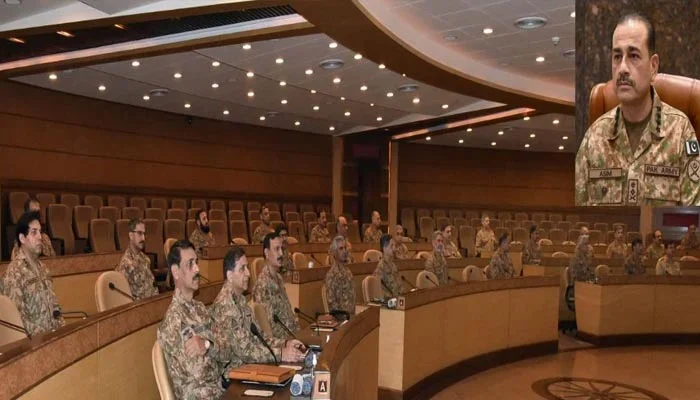By Staff Reporter
ISLAMABAD: Pakistan’s top military leadership conducted a thorough review of domestic and regional security challenges on Saturday, emphasizing the need for a united effort by the entire nation and government to eradicate terrorism from the country.
During the 257th Corps Commanders’ Conference held at the General Headquarters in Rawalpindi, presided over by Chief of the Army Staff General Asim Munir, the army’s top generals vowed to continue intelligence-based operations against militant outfits operating in the country, according to a statement released by the military’s media wing, ISPR.
The participants agreed that “this approach would be key to eliminating the permissive factors of terrorism, extremism, and instability in the country”.
The country has witnessed a surge in militant attacks, with Khyber Pakhtunkhwa and Balochistan provinces remaining particularly vulnerable to the violence generated by insurgent groups like the Tehreek-e-Taliban Pakistan (TTP) and separatist entities such as the Baloch Liberation Army (BLA).
These groups are believed to be based in Afghanistan, which shares porous borders with both Pakistani provinces.
Officials in Islamabad have raised the issue with the government in Kabul while urging the Taliban interim administration not to allow their country’s soil to be used by militant outfits to launch attacks against other states.
During the conference, the top army generals evaluated a wide range of security problems facing the country.
The ISPR statement said the forum affirmed that military leadership is aware of the full spectrum of challenges and is committed to fulfilling its constitutionally mandated responsibilities with the support of the resilient people of Pakistan.
“It highlighted that while security forces are undertaking intelligence-based operations in areas along [the country’s] western border, there was a need to adopt a whole of the nation and whole of the government approach to eradicate the menace of terrorism on long term basis.”
The participants of the conference agreed that a focused counterterrorism campaign approved by the government could help address the problem of militant violence and restore stability in Pakistan, if the whole governance system was geared toward achieving this goal.
The forum “reiterated the commitment of the armed forces to fully support national responses against internal and external threats”.
The corps commanders also agreed to pursue the security objectives set by the National Security Committee, chaired by the prime minister, to turn the tide against militant violence through a coordinated application of all elements of national power.
The country’s highest security body last month decided to re-launch the National Action Plan (NAP) within 15 days to crush the resurgence of terrorism by Pakistani Taliban in tribal districts along the border with Afghanistan.
The National Security Committee (NSC), at its 41st meeting, also set up a high-level committee to submit recommendations regarding the implementation and limitations of the operation within two weeks.
The TTP was set up as an umbrella group of several militant outfits in 2007, in November last called off a ceasefire agreed upon with the government in June and ordered its militants to stage terrorist attacks across the country.
The group has been blamed for several deadly attacks across Pakistan, including an attack on army headquarters in 2009, assaults on military bases, the 2008 bombing of the Marriott Hotel in Islamabad, and the massacre of 134 children at a military-run school in the northwestern city of Peshawar in December 2014.
Copyright © 2021 Independent Pakistan | All rights reserved




